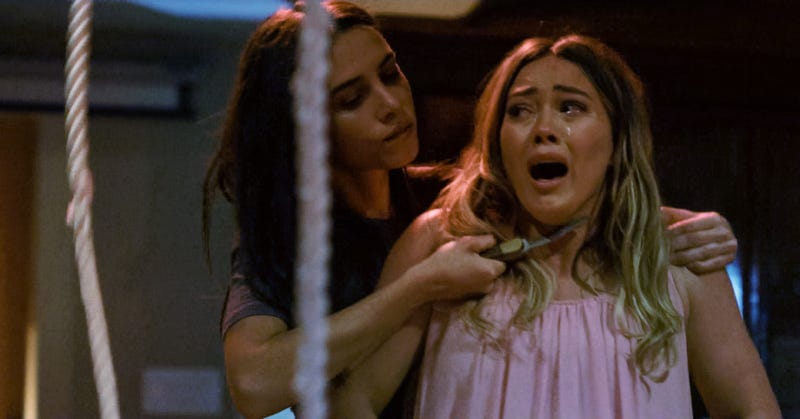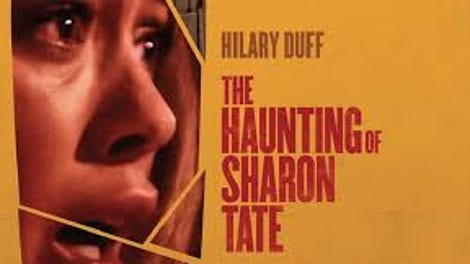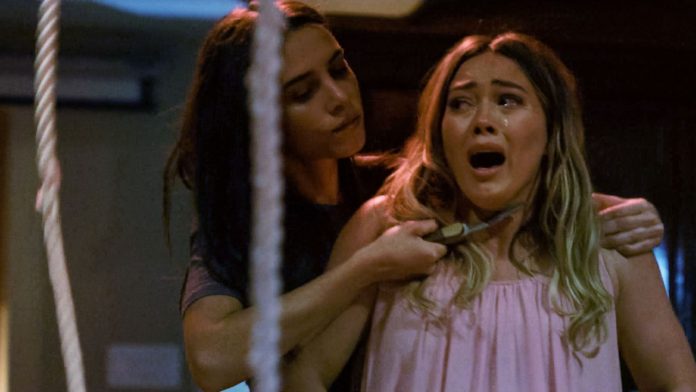

In a way, it’s gratifying to know that there are still filmmakers out there pumping out exploitation trash like The Haunting Of Sharon Tate. It’s a type of film we don’t see as much anymore, at least not outside of the niche world of underground horror: cheap, opportunistic, sadistic, artless, and completely shameless. In that way, it’s of a piece with the “Mansonsploitation” movies of the 1970s, particularly the infamous Last House On Dead End Street (1977), another film whose bargain-basement production values lend its scenes of brutal violence a certain unsettling snuff-movie realism. But it’s also very of the moment, as The Haunting Of Sharon Tate represents a more contemporary subgenre of exploitation cinema: the “mockbuster.”
As anyone who cares enough about movies to read this review presumably already knows, Quentin Tarantino has a film coming out this summer called Once Upon A Time In Hollywood. The film features Sharon Tate and Charles Manson as characters, and its original release date of August 9, 2019, exactly 50 years after the murder of Tate and four other people by members of the Manson family, raised enough eyebrows that it’s since been changed to late July. No such considerations have been given for The Haunting Of Sharon Tate, which co-opts a fan theory about Tarantino’s film in a craven attempt to beat that possible twist to theaters by several months.
But don’t think that fudging the details means we’re spared from having to watch the murders. We still see Tate (Hillary Duff) and her good friends, hairstylist Jay Sebring (Jonathan Bennett), coffee heiress Abigail Folger (Lydia Hearst, whose casting is arguably the most clever thing about this film), and Polish expat Wojciech Frykowski (Pawel Szajda), die in extreme pain and distress alongside Tate’s groundskeeper, Steven Parent (Ryan Cargill). We see it twice, actually: First, in a prelude where Tate describes a “vision” she had of herself and Sebring being bled like pigs in her living room, and again in an extended, deeply upsetting sequence midway through the film. And if that’s not enough, we also get a long, unbroken shot winding through Tate’s home in the Hollywood hills, gliding past each mutilated body one by one, before stopping to linger on Duff’s fake pregnancy belly streaked with blood.

Worse yet, the film also posits Charles Manson (Ben Mellish)—a contemptible psychopath with a legacy so fraught that The A.V. Club declined to note his death in late 2017, despite his long pop cultural shadow—as a horror villain with supernatural powers. He’s a long-haired Babadook in head-to-toe denim whose face is only glimpsed briefly but whose menacing silhouette hovers in the background as Tate becomes obsessed with premonitions of her own death in the days leading up to the murders. Manson’s main method of torturing poor Sharon is making a reel-to-reel player in a back bedroom turn off and on in the middle of the night—poltergeist activity that could be called Conjuring-esque if it were better staged. And when Manson follower Tex Watson (Tyler Johnson) does show up on the scene, he walks with the heavy gait of a Michael Myers or a Jason Voorhees.
But before the film turns into an all-out slasher movie, it’s first a shockingly inept drama, featuring a lead performance that makes Lindsay Lohan’s turn as Elizabeth Taylor in the Lifetime movie Liz & Dick look positively awards-worthy in comparison. Like Lohan’s, Duff’s attempt at a mid-Atlantic accent comes and goes intermittently, and is pretty awful even when she does put effort into it. And that’s just one bad performance in a film that’s full of them, a contamination that becomes an epidemic thanks to the convoluted dialogue dumps on every single page of writer-director Daniel Farrands’ script. It’s all very silly, even before the explicitly satanic stuff comes in.

It’s not an exaggeration to say that this film fails on every artistic level. The sound is hollow and overdubbed to the point of distraction. The editing is sloppy. The camerawork is shaky. The CGI is cheap, and glaringly obvious when it does appear—mostly as blood spatter, but also in a digital pan over the Hollywood hills that makes absolutely no sense, given there are many shots of the real thing in the film. The set decoration and costumes are on the level of your average sketch-comedy troupe, simply draping American flags and paisley prints over otherwise modern people and places to create an utterly unconvincing 1969.
Dramatizing real-life crimes can be an impactful if counterintuitive method of memorializing the victims, driving home the horror of what happened to them by not shying away from the details. (See The Snowtown Murders or Hounds Of Love for examples of how to do a true-crime drama with minimal exploitation.) Turning the Tate murders into a bogeyman campfire tale is disrespectful in the extreme, because it shows just how little reverence Farrands has for the suffering he’s reenacting. But the worst part of The Haunting Of Sharon Tate is how seriously it takes its ham-fisted themes of fate and the nature of reality; the movie opens with an Edgar Allen Poe quote, for fuck’s sake. At least the producers of Ilsa, She-Wolf Of The SS had the good judgement to make up their insincere epigraph.





































